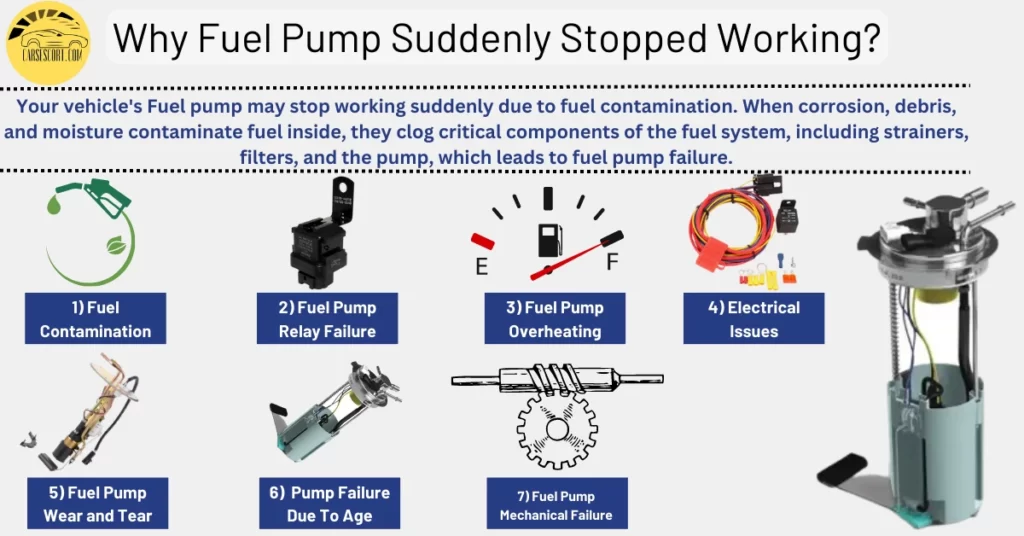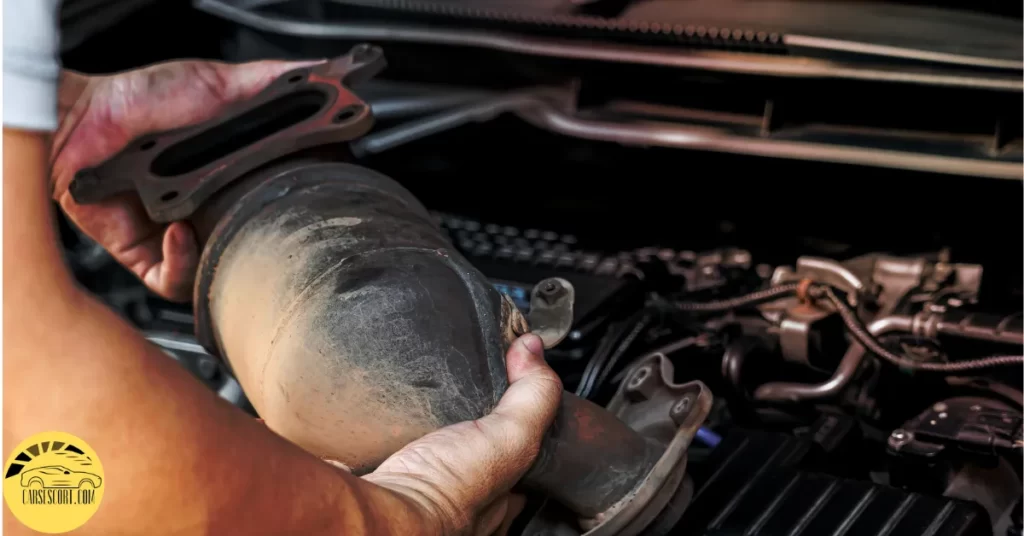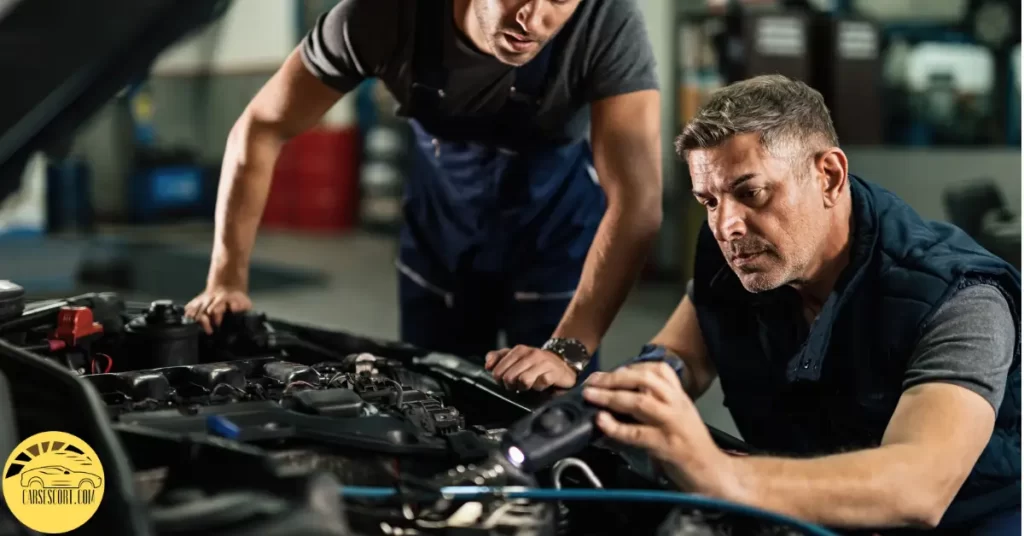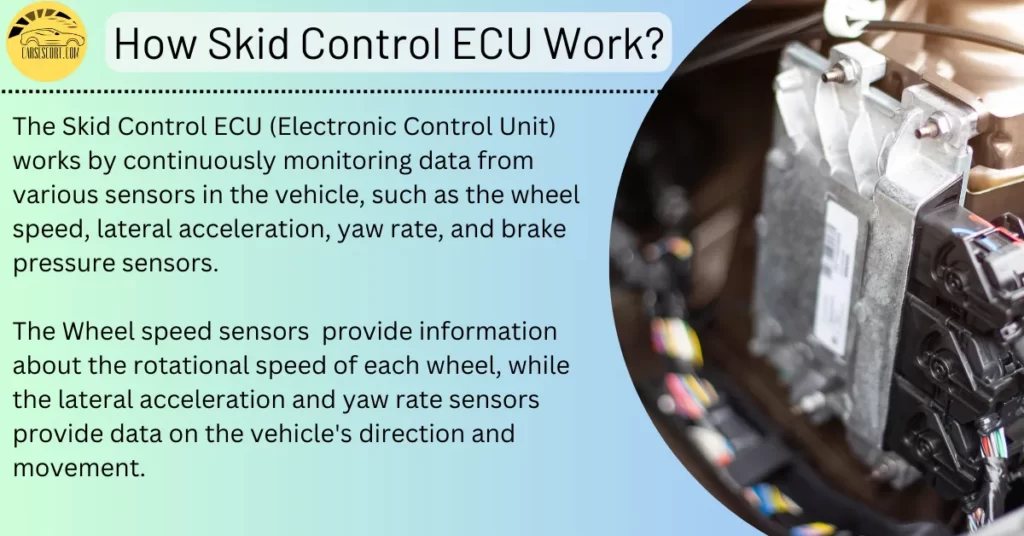Your vehicle’s fuel pump may stop working suddenly due to fuel contamination. When corrosion, debris, and moisture contaminate fuel inside, they clog critical components of the fuel system, including strainers, filters, and the pump, which leads to fuel pump failure.
Several other reasons can also cause your car fuel supply pump to malfunction. Some problems are considered minor and can be addressed quickly by yourself.
However, some issues that will need a professional mechanic’s help can be more complicated.
This blog post is the ultimate guide to “Fuel Pump Suddenly Stopped Working”. Be with us and learn more.
Why Fuel Pump Suddenly Stop Working?

The fuel pump is an integral component of any internal combustion engine, responsible for supplying the engine with the essential fuel it needs to run smoothly.
When this vital part unexpectedly fails, it can leave you stranded and wondering what went wrong.
The seven most common causes of fuel pump suddenly stopped working and failure includes:
1) Fuel Contamination
If impurities such as dirt, debris, rust, or water enter the gas tank, they can clog the pump or its components. The contamination can restrict fuel flow or damage the pump, leading to a sudden failure.

2) Fuel Pump Relay Failure
The fuel pump relay controls the power supply to the fuel supply pump. If the relay malfunctions, it can prevent the pump from receiving power, resulting in a complete shutdown or fuel system failure.
3) Fuel Pump Overheating
Most fuel pumps may overheat and stop functioning. Overheating can happen if the pump continuously runs at high speed for an extended period, causing it to overheat and fail.
Overheating can occur due to a faulty fuel pump driver module or a restricted fuel supply.
4) Electrical Issues

One common cause is an electrical problem. The fuel pump relies on an electrical circuit to operate. A fault in the wiring, a blown fuel pump fuse, a faulty relay, or a problem with the fuel pump’s power supply can lead to a sudden failure.
Faulty electrical connections or a damaged pump control module can also cause the pump to stop working.
5) Fuel Pump Wear and Tear
Like any mechanical component, fuel pumps can experience wear and tear over time. Continuous use, exposure to heat, and poor maintenance can cause the pump’s internal components, such as the motor or gas pressure regulator, to wear out.
Eventually, this can lead to a sudden failure.
6) Fuel Pump Failure Due To Age
Fuel pumps have a limited lifespan, typically ranging from 100,000 to 150,000 miles (160,000 to 240,000 kilometers).
As the pump ages, its performance may degrade and become less reliable. Eventually, the pump may fail, resulting in a sudden stoppage of fuel delivery.
7) Fuel Pump Mechanical Failure
The fuel pump may sometimes experience a mechanical failure due to a broken impeller, worn-out brushes, or a seized motor.
Mechanical failures can prevent the pump from generating sufficient pressure to deliver fuel, leading to a sudden shutdown.
Weak and Bad Fuel Pump symptoms
A malfunctioning fuel pump can lead to frustrating symptoms and irregularities in your vehicle’s performance.
Here are some common weak fuel pump symptoms to watch out for:
1) Engine Sputtering or Hesitation
A weak gas pump may not be able to provide a consistent flow of fuel to the engine, resulting in momentary sputtering or hesitation during acceleration.
2) Loss of Power
Fuel pump is responsible for delivering fuel to the engine. If the pump is not delivering enough fuel to the engine, it can cause a noticeable loss of power, especially when trying to accelerate or climb steep hills.
3) Engine Misfires
Inadequate fuel supply can lead to engine misfires, causing the engine to run unevenly or jerk while driving.
4) Difficulty Starting Engine
A weak fuel pump may struggle to provide the necessary fuel pressure for the engine to start, resulting in prolonged cranking or difficulty starting the vehicle and sputtering engine.
5) Stalling
When the gas pump is failing, it may not be able to maintain a consistent fuel flow, causing the engine to stall unexpectedly, especially at idle or low speeds.
6) Increased Fuel Consumption
A fuel pump not functioning properly can result in inefficient fuel delivery, leading to excess gas consumption and decreased fuel efficiency.
7) Engine Surging
Surging or fluctuating engine RPMs, where the engine speed rapidly increases and decreases without driver input, can indicate a weak fuel pump.
8) Fuel Smell
A leaking or faulty pump can sometimes cause a noticeable fuel odor around the vehicle, indicating a potential problem.
9) Check Engine Light (CEL) Illumination
A malfunctioning gas pump can trigger the Check Engine Light on the vehicle’s dashboard. This light indicates that the engine control module (ECM) has detected a problem with the fuel system, including the pump.

Read More Informative Articles From Our Cars Guide:
What Are Failing Fuel Pump Symptoms?
Fuel pump failure signs can vary from bad or weak pump symptoms. Below are the common failing fuel pump symptoms.
1) Whining Noise From the Fuel Tank
One common symptom of a failing fuel pump is a whining noise coming from the fuel tank. A worn-out or damaged gas pump motor often causes this noise.
The whining sound may increase as you accelerate, indicating the pump is malfunctioning.
2) Your Car Dies Immediately After Starting
If your car starts but immediately stalls or dies, it could be a sign of a failing fuel pump. A weak or faulty gas supply pump may not provide sufficient fuel to keep the engine running, causing it to shut off shortly after starting.
3) Difficulty Starting
You may experience extended cranking or multiple attempts before the engine starts. This occurs because the pump is not delivering adequate fuel to the engine, resulting in a delayed or unsuccessful start.
4) Your Car Won’t Start
A completely failed gas pump sometimes prevents your car from starting. When the gas pump fails to supply fuel to the engine, the combustion process cannot occur, and the engine will not start.
5) Engine Sputtering
If your engine sputters or runs unevenly during acceleration, it could indicate problem. A failing pump may be unable to maintain a consistent gas flow, leading to intermittent fuel supply to the engine.
This can result in sputtering, hesitation, or rough running when you press the accelerator.
6) Stalling at High Temperatures
If your car tends to stall or shut off when the engine reaches high temperatures, high temperatures stalling could be a sign of a bad fuel pump issue.
Excessive heat can cause the fuel pump to malfunction or lose its ability to maintain proper fuel pressure.
7) Loss of Power Under Stress
When the gas pump fails, it may struggle to supply adequate fuel to the engine during increased demand, such as during acceleration or while climbing uphill.
This can result in a noticeable loss of power and a sluggish or weak response from the engine.
How To Fix a Fuel Pump That Suddenly Stops Working?
If your fuel pump suddenly stops working, follow these steps to troubleshoot and fix the issue.
1) Check the Fuel Level
Ensure you have adequate fuel in your vehicle’s tank. The fuel gauge may be inaccurate, and you may have run out of gas without realizing it.
2) Listen for Noise
When you turn the ignition key to the “ON” position (without starting the engine), listen carefully for a buzzing or whirring noise from the fuel tank.
These noises indicate that the gas pump is receiving power and functioning. It could be a sign of a faulty gas pump or a related component if you don’t hear anything.
3) Check the Fuse and Relay
Locate the fuse box and find the fuse or relay associated with the fuel pump. Refer to your vehicle’s manual to identify the correct one. Inspect the fuse to see if it’s blown, and replace it if necessary.
Similarly, you can swap the pump relay with a similar one from another system in the fuse box to see if that resolves the issue.
4) Test Electrical Connections
Disconnect the electrical connector to the pump and inspect it for any signs of damage or corrosion. Clean the connections if needed.
Use a multimeter to check for voltage at the connector while someone turns the ignition key to the “ON” position.
If no power reaches the fuel pump, there may be an issue with the wiring or a faulty control module.
5) Fuel Pump Inertia Switch (if equipped)
Some vehicles have an inertia switch that shuts off the pump in case of a collision or sudden jolt. Check if your vehicle has one and ensure it hasn’t been tripped.
Resetting the switch may restore power to the gas pump.
6) Consult a Professional
If you cannot identify or fix the problem yourself, it’s recommended to take your vehicle to a qualified mechanic or automotive technician.
They have the expertise and specialized tools to accurately diagnose and repair issues.

FAQ
How long do fuel pumps last?
The lifespan of a fuel pump can vary depending on several factors, including the quality of the pump, driving conditions, and maintenance.
On average, a fuel pump can last anywhere from 100,000 to 150,000 miles (160,000 to 240,000 kilometers).
However, it’s important to note that some fuel pumps may fail earlier or last longer, depending on individual circumstances.
Why is the fuel pump not turning on?
Several reasons could cause a fuel pump not to turn on. Common issues include a faulty pump relay, a blown fuse, a malfunctioning pump control module, or wiring problems.
A low fuel level or a clogged fuel filter can also prevent the gas pump from activating.
Why is the new fuel pump not turning on?
If a newly installed fuel pump is not turning on, it could be due to several reasons. Some possibilities include an incorrect installation where the connections are not properly secured, or the wiring is faulty.
It is also possible that the new pump is defective, which can happen on rare occasions.
Why won’t the fuel pump turn on with ignition?
When the fuel pump fails to turn on along with the ignition, it may be due to a faulty fuel pump relay, a blown fuse, or a problem with the ignition switch.
The pump relay sends power to the pump when the ignition is turned on. If the relay fails, it can prevent the gas pump from receiving power.
Can a fuel pump fail suddenly?
Yes, a fuel pump can fail suddenly without any warning signs. However, in most cases, there are usually some indications of a failing fuel pump before it stops working.
These signs may include difficulty starting the engine, engine misfires, a loss of power during acceleration, or unusual whining noise from the fuel tank. It is essential to address these symptoms promptly to avoid potential breakdowns or damage to the engine.
My Final Thoughts
Fuel Pump Suddenly Stopped Working: It is crucial to understand that fuel pump failure can occur unexpectedly due to fuel contamination caused by corrosion, debris, and moisture.
While the vehicle owner can resolve minor problems, it is essential to recognize that specific issues require the expertise of a professional mechanic. Regular maintenance and monitoring of the fuel system can prevent such problems and ensure the smooth operation of your vehicle.
By staying vigilant and seeking professional assistance, when necessary, you can keep your car’s fuel supply pump functioning optimally and enjoy a hassle-free driving experience.
Affiliate Disclosure: Cars Escort is a participant in the Amazon Services LLC Associates Program. As an Amazon Associate, we earn from qualifying purchases made through affiliate links on our site. Read Our Disclaimer .

